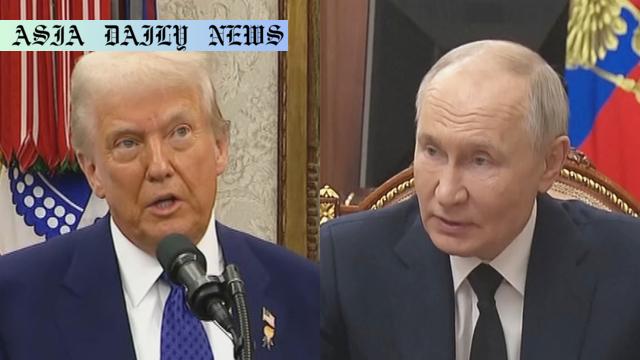Ukraine: Trump expresses disapproval of Putin’s aggressive actions in Ukraine, mentioning the recent aerial attacks and ongoing conflict.
Trump expresses criticism of Putin’s large-scale attacks on Ukraine.
Russia initiated 298 airstrikes in 3 days, making it the largest attack since the invasion.
Ukraine and Russia conducted a 1,000 prisoner swap amid rising tensions.
Trump hints at potential future sanctions against Russia.

Trump Criticizes Putin’s Actions in Ukraine
Former US President Donald Trump has openly criticized Russian President Vladimir Putin over the aggressive actions taking place in Ukraine. During a conference on Sunday, Trump commented on “not liking what Putin is doing” and expressed concern over the casualties caused by recent Russian airstrikes. This reaction from Trump marks a significant public denunciation of a leader he had previously described as someone he “got along with.”
The war has escalated, with Moscow conducting what Reuters calls the “largest aerial attack” since the start of the invasion, launching 298 drones and 69 missiles over a 3-day period. The ongoing assault has led to devastating losses, widespread fear, and growing international pressure on Russia to end the conflict. Trump’s remarks reflect his frustration with the brutality of the situation and his own disappointment in a leader he has long known personally. “This isn’t my war,” he emphasized, yet he maintained a stance of readiness to intervene diplomatically should the opportunity arise.
Prisoner Swap as a Temporary Relief
Amidst the chaos, Ukraine and Russia successfully carried out a three-day prisoner swap, exchanging 1,000 prisoners each. This effort was a direct result of negotiations facilitated by Turkey and has provided a fleeting moment of relief for many families on both sides of the conflict. However, these exchanges, although momentarily reassuring, fail to address the escalating violence, particularly after the intense airstrikes over the weekend.
Despite the glimmer of hope that the swaps represent, many experts argue that meaningful progress will require deeper diplomatic interventions. The talks between Trump and Putin last week did not result in a ceasefire, as Putin refused to agree to halt aggression. As diplomatic tension persists, this lack of resolution leaves thousands of lives vulnerable to a war that continues to escalate.
Heightened Attention on International Sanctions
Trump mentioned the potential imposition of additional sanctions on Russia, hinting at financial measures that could target the Kremlin as a way of influencing its actions. The use of sanctions has been a pivotal tool for countries opposing the Russian invasion, aiming to weaken its economic capacity to continue the war. Trump’s openness to reconsider using sanctions shows his acknowledgment of the scale of violence gripping Ukraine and his potential role as a catalyst for peace.
Still, the success of sanctions depends heavily on their implementation and the cooperation of other economic powers. Analysts contend that sanctions alone might not be sufficient to deter Putin, considering that his actions have so far defied international condemnations and penalties. With an enduring crisis, coordinated efforts must go beyond sanctions to include negotiations and potentially a stronger involvement of global powers.
Looking Forward: Is There Hope for Peace?
The war in Ukraine marks one of the greatest geopolitical crises of the 21st century and reflects the fragility of international diplomacy. While the prisoner swap and some diplomatic talks signal minor successes, the human cost remains staggering, with actionable resolutions still out of reach. Trump’s remarks underscore the mounting frustrations shared by global leaders who seek to address this complex conflict.
As negotiations continue, it remains uncertain whether voices like Trump’s will translate into actionable results or remain symbolic gestures. In any case, the path to peace will likely require multi-faceted approaches, sustained international pressure on Russia, and support for Ukraine as it defends itself. The coming months may prove pivotal in determining whether diplomacy or violence will shape this ongoing war.
Commentary
Trump’s Stance Reflects Growing Frustration
The comments from former President Donald Trump about President Vladimir Putin’s actions in Ukraine reflect a sense of frustration that spans beyond political affiliations. Trump openly criticized the large-scale airstrikes and expressed disbelief over the situation escalating to such violent levels. For a leader who has historically maintained a diplomatic relationship with Putin, these words carry significant weight in the global discourse surrounding the conflict.
Sanctions: A Key Approach But Not A Solution
Trump’s openness to implementing additional sanctions could indicate a shift in strategy should he find himself in a position of influence once again. However, sanctions have their limits. History has shown that while they strain economies and send strong signals, they rarely bring about immediate peace. In the case of Russia, sanctions alone may not be persuasive enough to halt military aggression, especially when Putin remains committed to his objectives despite economic setbacks.
A Complex Road to Negotiation
What stood out in Trump’s statements is his willingness to step away from negotiations if progress is not evident. While this may reflect frustration, it also points to the complexities involved in such discussions. Reaching a resolution would require careful coordination among global leaders, as well as Putin’s willingness to concede to certain demands—a highly unlikely scenario given his actions so far.
The focus must remain on achieving a balance between diplomatic pressure and support for Ukraine in this tumultuous period. Whether through prisoner swaps, ceasefire agreements, or broader sanctions, every step must aim at reducing human suffering while holding violators accountable.


